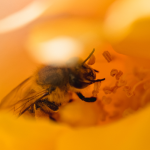The Hobsons sit at the table eating stewed damsons from soup spoons. Teddy Hobson has returned home from the camps a free man, only to find a stranger in his daughter’s place. It is four years since Mary, not long out of aprons, was sent to live with her aunt for her own safety. Now she is back with a soft, foreign lilt to her voice. Her twin brothers had teething gums and dimpled limbs when she left. Now they are all legs and elbows and easy smiles.
It’s not that Mary is unrecognisable, as such. Her eyes and nose and mouth are the same shape and in that familiar configuration, but everything now points downwards, as if she has wilted from within. Teddy would like to pinch her cheeks once more, but his daughter’s eyes won’t meet his as she lifts the spoon to her mouth and carefully lays the damson stones on the rim of her bowl. ‘Such a vibrant fruit, the damson,’ Teddy says. The fruit is sour with so little sugar for sweetening. Sugar is still in short supply.
‘They never look promising on the tree,’ his wife replies.
Mary’s brothers pipe up: ‘Nor in the bowl!’
‘On the tree,’ says Mary, ‘they are like the bruised skin of a corpse.’
Her mother crosses herself. ‘Whenever have you seen a corpse?’
‘It doesn’t matter.’
‘Mary, for the love of God…’ In her agitation, Mrs Hobson upsets her husband’s bowl, leaving a trail of stones across the table. ‘And you’re no better, Edward.’ She dabs at the spots of damson juice blooming on the cloth like freshly-spilled blood. ‘You’ve come home with a face that could curdle milk.’
Teddy pales. Doesn’t he hold his own feelings in check? Just this morning, the gardener felled his father’s weeping willow. Examining its thinning crown and drooping branches, the gardener’s face was grave: ‘Too far from water, see,’ he said. ‘Its roots are parched. Wants planting near a river, the willow.’
While the gardener swung his sharpened axe and reduced the willow to a stump, Teddy remembered his father digging the hole for the sapling. The nerve in Teddy’s left eyelid flickered as he watched. Such things he has seen, and yet he will not talk of them.
Mrs Hobson points at the flesh-stripped damson stones and in a sing-song voice, says: ‘So, Mary, who will you marry?’
‘Tinker, tailor, soldier, sailor,’ Mary counts with the tip of her spoon, ‘rich man, poor man…’
‘A thief! A thief!’ chorus her brothers. ‘Mary’s going to marry a thief!’
The girl puts down her spoon. ‘What would a thief want from me?’ She wipes the crimson juice from her lips. ‘Why, there’s nothing worth stealing.’ She looks to Mr and Mrs Hobson. Such things she has seen, in the safety of her aunt’s house, where voices never rose above a hush.
‘There’s plenty,’ says her father. He pinches his daughter’s cheeks and she raises her eyes. Is that a smile she gives? ‘My Mary,’ he says, and he wonders at the years that have passed, the two of them away from home. Is time a thing that can be stolen?
Through the window, he sees the bare earth where his father’s willow once grew. Mary used to swing from its branches. It was strong, then, and could carry her weight. ‘We shall plant something new, Mary, to replace what’s gone. Something perfect.’
…
Biography
Emily Devane has always wanted to write a story about the damsons she picked as a child in her grandmother’s orchard. She now lives in Ilkley, West Yorkshire, where she writes, edits and teaches. Emily’s work has won prizes and been widely published. She is an editor at FlashBack Fiction and tweets @Devaneemily.
Image: unsplash.com





